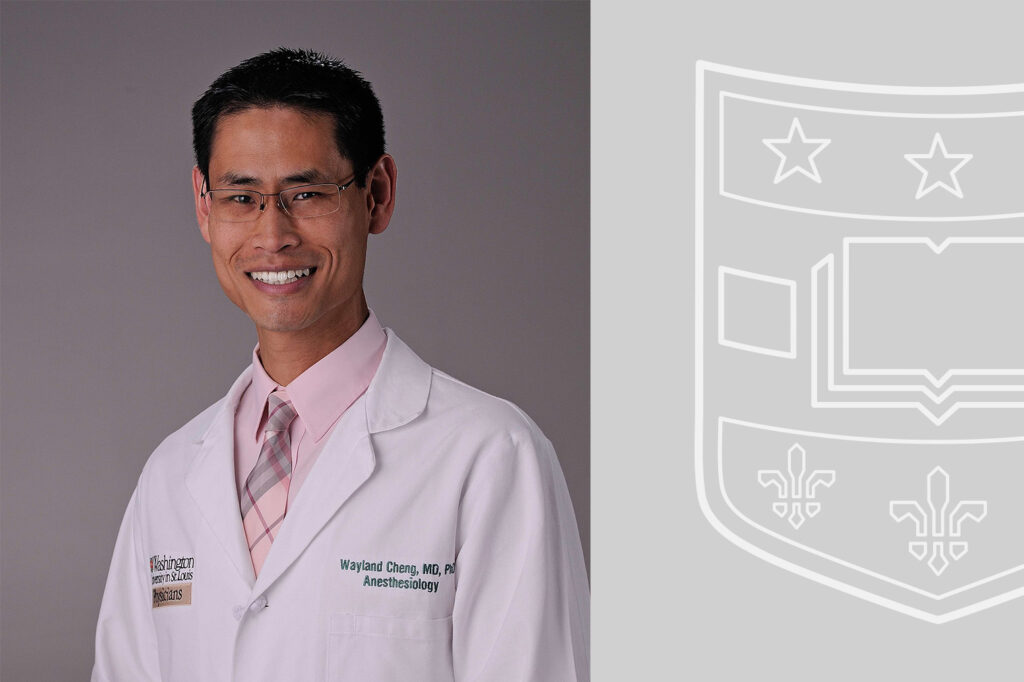Wayland Cheng, MD, PhD, has been selected as the 2021 recipient of the prestigious Frontiers in Anesthesia Research Award (FARA) from the International Anesthesia Research Society (IARS). This grant is unique in that it is only awarded once every several years and is the largest research grant bestowed by IARS, with competitive applications from around the globe. The FARA fosters innovation and creativity by an individual investigator, funding projects with significant originality and scientific excellence, with an eye toward developing future leaders in the field. Dr. Cheng is only the 12th recipient since the inception of this award in 1995; in 2009 another faculty member in the Washington University School of Medicine (WUSM) Department of Anesthesiology was also a FARA recipient.
Dr. Cheng’s project, entitled “Structural Pharmacology of the Nociceptive Ion Channel TRPM3,” focuses on TRPM3 for the treatment of pain, and seeks to harness state-of-the-art structural biology approaches to facilitate drug discovery for this ion channel. Dr. Cheng is among very few physician scientists in anesthesiology who are successfully harnessing cryo-EM and chemical biology techniques to understand ligand binding to protein receptors. His plan to also perform structure-based virtual screening is an exciting new approach in his research program, and this project has the potential to have a significant impact in pain research and analgesic development. Dr. Cheng’s FARA proposal was selected for its innovation, scientific rigor, and remarkable translational potential.
Dr. Max Kelz, chair of the IARS Research Committee, remarked, “Over the past quarter century, the IARS has been awarding its signature Frontiers Grant to a single individual once every two or three years. Dr. Cheng’s proposal to study the structural pharmacology of the nociceptive ion channel TRPM3 was selected from a highly competitive list of accomplished clinicians and scientists spanning 4 countries across 2 continents. In only his 3rd year on faculty, Dr. Cheng is the youngest recipient of the Frontiers Award in its history. Nevertheless, Dr. Cheng embodies all of the qualities the IARS seeks to support. His proposal was deemed the most novel, innovative, and carried true translational potential to beneficially impact anesthesiology, pain medicine, and the perioperative neurosciences. We at the IARS look forward to seeing all that Dr. Wayland Cheng will accomplish over the years to come.”
Dr. Cheng completed his MD and PhD degrees via the prestigious Medical Scientist Training Program (MSTP) at WUSM and then entered the ACGME-approved WUSM Department of Anesthesiology’s Academic Scholars Advancement Program (ASAP). This is an innovative accelerated program that integrates internship, residency, clinical fellowship, as well as almost two years of dedicated research time into a five-year period. Unique among anesthesiology residency training programs, ASAP offers substantial career acceleration for clinician-scientists interested in pursuing both a clinical fellowship and research. As a T32 research scholar, in the last two years of the ASAP, and subsequently as an IARS Mentored Training Research Grant recipient and then as an NIH K08 scholar, Dr. Cheng was mentored by Dr. Alex Evers and established the scientific foundation for the research underpinning the 2021 Frontiers in Anesthesia Research Award.
According to Michael Avidan, MBBCh, FCA SA, and chair of the Department of Anesthesiology, “Dr. Cheng embodies many of the qualities that we all value in clinician scientists. Apart from being a dedicated, talented, and innovative researcher, he is also an outstanding clinical cardiothoracic anesthesiologist, a committed and inspiring educator, and a collaborative and engaged member of our academic community. We are all extremely proud of Dr. Cheng’s accelerated progress, and celebrate with him as he is uniquely recognized by the International Anesthesia Research Society for his scientific prowess and the transformative potential of his research.”
